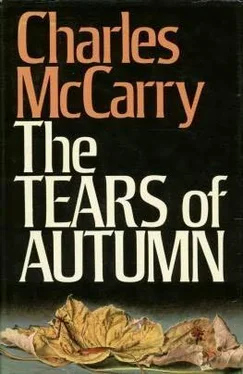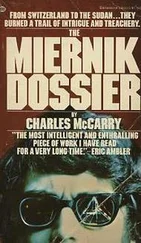Now that the syringe was out of sight, Pigeon was less agitated. But when he spoke, he stammered and his voice broke. He was not used to being powerless. “Those guys in the masks,” he said. “They don’t even know who I am.”
“No, they don’t. Here, Mr. Pigeon, you’re nobody.”
“They took fucking pictures of me!”
“Yes, those were their orders. We’ll keep the photographs. We may want to mail them to the United States, to certain of your friends.”
“Do that, and they’ll come after you.”
“Will they? I thought they’d be more likely to ask you if you talked, and what you talked about.”
“I want those pictures,” Pigeon said. “I’m not having any goddamn pictures of me with no clothes on and…” He saw his fouled legs and turned his head aside, biting his lip like a shamed child.
“Let me tell you what we know,” Christopher said. “In 1956 you received a retainer of one hundred thousand dollars from a short bald man with a foreign accent who told you his name was Blanchard. You didn’t hear from Blanchard again until the last week in November of this year. You then received a cable from Naples stating that your Uncle Giuseppe had died. Following the plan Blanchard had given you seven years before, you went to an apartment on Cedar Street in Chicago, and received instructions for a job. You carried out the job. On November 25, two of your men, Anthony Rugged and Ronald Prince, went to the bank of Dolder und Co. in Zurich, and collected a million dollars in hundred-dollar bills. They identified themselves with the code name tortora, which, as you know, means ‘pigeon’ in English.”
“You know so much, tell me what the job was,” Pigeon said.
Christopher picked up the hypodermic and depressed the plunger, so that a thin stream of the yellow serum squirted out of the needle and through the light. “That’s what you’re going to tell me,” he said.
“You can kill me!”
“No. I give you my word I won’t do that. Not with a gun or a knife, or anything quick.”
The trembling of Pigeon’s body intensified. He stared into the light, then turned his whole body away from its glare. He swallowed noisily. When at last he was able to speak, he did so in a rapid soprano voice, like a castrato.
Christopher had to ask him only two or three questions. When Pigeon was done, Christopher left the room, taking the hypodermic with him, and the spool of tape on which he had recorded Pigeon’s hysterical spillage of what he had done to earn Klimenko’s money.
Upstairs, Christopher typed out a summary of Pigeon’s statement on a single sheet of foolscap. When he was finished, he removed the ribbon from the typewriter and put the spools in his pocket; on his way back to the interrogation room, he dropped the ribbon into the red coals of the furnace and watched it burn.
Frankie Pigeon sat where Christopher had left him, his bloodless legs intertwined, his hands gripping the seat of the folding chair. Christopher put the sheet of foolscap on the table and told Pigeon to read it. He ran his empty eyes over the paper.
“Sign it, and give me your right hand,” Christopher said. He inked each of Pigeon’s limp fingers and rolled them over the paper, so that he had a full set of prints to authenticate the signature that ran drunkenly down the page.
He left Pigeon staring at his own hand, blackened by the ink. He still wore a large diamond on his small finger.
In the kitchen Glavanis and Eycken were playing piquet with fierce concentration. When they finished the hand, Christopher gave them their pay.
“Give the man this injection,” Christopher said, handing Glavanis the hypodermic. “He’ll be terrified, so you’ll have to subdue him.”
“What is it?”
“It’ll knock him out for eight hours or so, it’s harmless. He thinks it’s leprosy germs. Dress him, and blindfold and gag him. Drive north on the Via Flaminia and drop him in a field, away from the main roads, at least three hundred kilometers from Rome. Then turn in the car at Auto Maggiore in Milan and leave the country.”
“I’ve been thinking about what you said,” Glavanis said. “He did see our faces.”
“He won’t want to see them again. He has no idea where he is now, or where to look for you.”
“All the same, Paul-if you have what you want…”
“There’s an operational reason why he must stay alive.”
Glavanis rested his brown eyes, which were as steady and as liquid as those of a young bride, on Christopher for a moment, then laughed and slapped him on the shoulder. “You always have a reason to let them live,” he said. “One day you’ll wish you hadn’t been so merciful.”
Christopher shook hands with both men. He stared at Eycken’s thumbless hands, and looked questioningly at Glavanis.
“It’s all right,” Glavanis said. “Eycken wore rubber gloves all the time we were downstairs.”
As soon as he heard the car go down the drive, Christopher put the villa in order. Glavanis and Eycken had left nothing behind but fingerprints; he removed those with furniture polish and a cloth. He photographed Pigeon’s confession and developed the film.
Before he left, he entered the interrogation room again. He recalled Frankie Pigeon’s clogged treble voice, answering the final questions.
“What did Ruby say when you gave him the contract?”
“Nothing. He was overjoyed to hit that faggot.”
“Didn’t he ask for money?”
“What did Jack want with money?” Pigeon had asked. “He thought he was going to get the Congressional Medal of Honor.”
Christopher knew where Alvaro Urpi prayed. Each morning Urpi walked down the Tiber, crossed the river on the Ponte Palatino, and spent the first three hours after sunrise on his knees in the church of Saint Sabina. Urpi liked the place because it was named for a saint who was converted to Christianity by her slave, because it was almost barren of decoration, with great white columns standing in its nave-and because one could look through a peephole into a hidden garden and see an orange tree grown from the seeds of a tree planted seven hundred years before by Saint Dominic, a Spaniard who had the mind of a Moor, as Urpi had the mind of a Chinese.
Christopher waited at the back of the church while a young priest said Mass and Urpi finished his prayers. Christopher went with him to look at the orange tree and listen to the story again. “Dominic has a better immortality than stone,” Urpi said, and blushed, made shy by the poetry of his thought.
They went back to the Vatican together; Urpi walked like a Chinese, in small rapid steps with his arms held stiff at his sides and his eyes on the pavement. He showed Christopher his translation of Yu Lung’s horoscopes. Christopher needed some help with the Latin: Urpi moved a finger from Yu Lung’s ideograms to his own crowded handwriting, his eyes darting like a bird’s from the material to Christopher’s face as he explained the difficulties of the translations.
“As I said, it’s obscure, metaphorical,” Urpi said. “But it’s plain that five men are involved. Three of them-two brothers and a foreign enemy-are marked for death. Also a woman who appears to be a virgin, and who has a relationship to three of the men. Her horoscope has to do with a journey and a message.”
“Can you construe her destination and the message?” Christopher asked.
“Oh yes. That part is plain enough.”
“And you’re certain of the identities of the persons who commissioned the horoscopes?”
Urpi nodded, reading out the Latin phrases. He pronounced very clearly. Christopher cleared his mind, memorizing what Urpi told him.
Читать дальше












